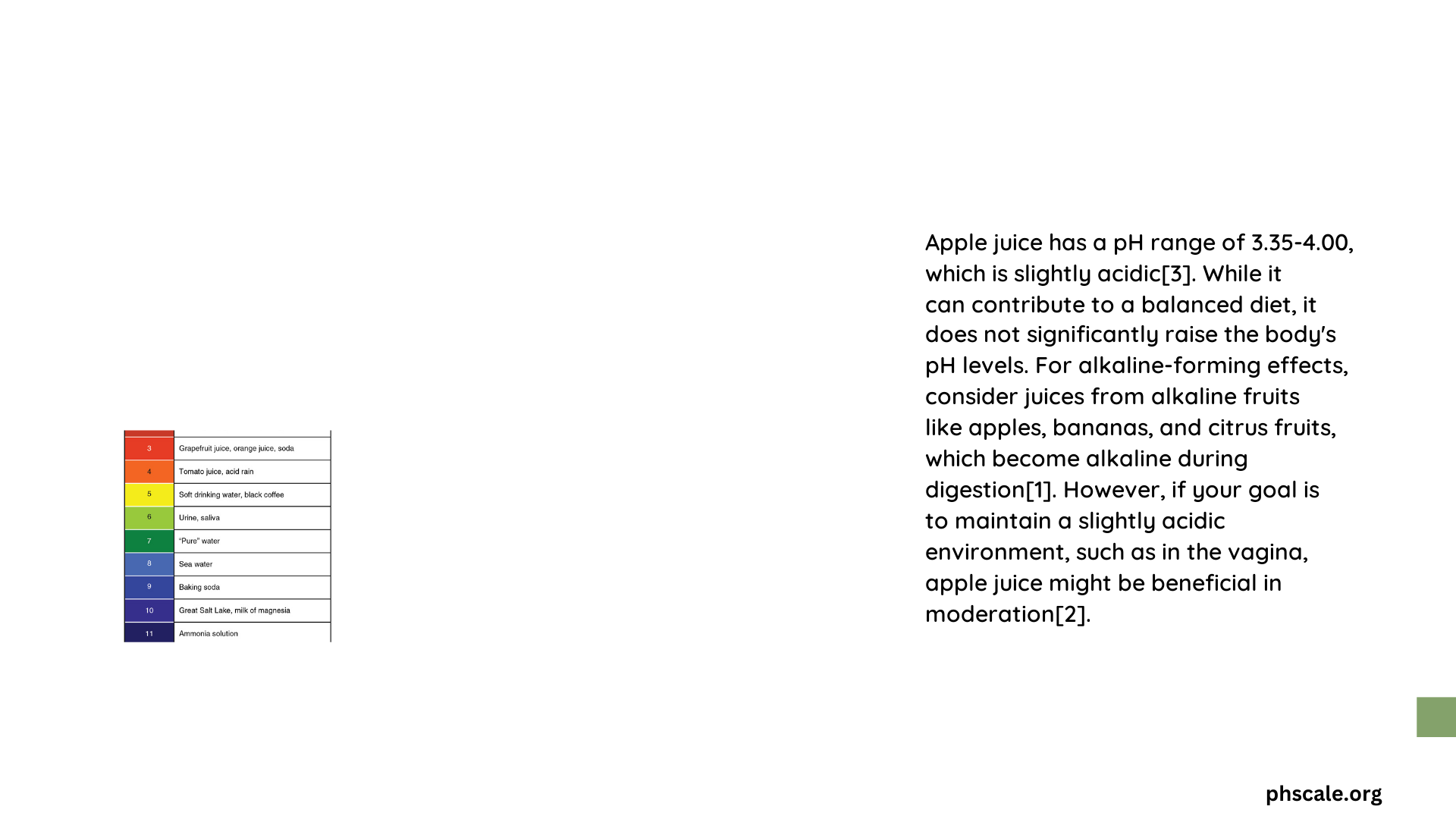Apple juice, a popular beverage known for its sweet taste and nutritional benefits, has been the subject of discussions regarding its potential impact on the body’s pH balance. While apple juice is indeed acidic, its effects on overall body pH are not as straightforward as one might think. This article explores the relationship between apple juice consumption and pH balance, examining scientific evidence and expert opinions to provide a comprehensive understanding of this topic.
What is the pH of Apple Juice?
Apple juice typically has a pH range of 3.35 to 4.00, making it acidic on the pH scale. This acidity is due to the presence of various organic acids, primarily malic acid, which gives apples their characteristic tart flavor. However, the acidity of apple juice is significantly less than that of stomach acid, which typically ranges from 1.5 to 3.5 on the pH scale.
How Does Apple Juice Compare to Other Beverages in Terms of pH?

To better understand the acidity of apple juice, let’s compare it to other common beverages:
| Beverage | Approximate pH Range |
|---|---|
| Apple Juice | 3.35 – 4.00 |
| Orange Juice | 3.30 – 4.19 |
| Cola | 2.30 – 2.70 |
| Coffee | 4.85 – 5.10 |
| Water | 6.50 – 8.50 |
As we can see, apple juice is less acidic than cola but more acidic than coffee and water.
Does Apple Juice Affect the Body’s Overall pH Balance?
The short answer is: not significantly. The human body has a robust buffering system that maintains a stable pH level in the blood and other tissues. This system is primarily regulated by the lungs and kidneys, which work to keep the blood pH within a narrow range of 7.35 to 7.45.
When you consume apple juice, it does not directly alter your body’s overall pH balance. Here’s why:
-
Digestive System Neutralization: As apple juice enters the stomach, it encounters highly acidic gastric juices. The stomach’s acidity helps to break down the components of the juice.
-
Buffering Action: The small intestine secretes bicarbonate to neutralize the acidic chyme (partially digested food mixed with stomach acid) as it moves from the stomach.
-
Homeostatic Mechanisms: The body’s homeostatic mechanisms, particularly the actions of the lungs and kidneys, work continuously to maintain the blood’s pH balance regardless of what we eat or drink.
What Are the Potential Health Effects of Apple Juice on pH-Related Conditions?
While apple juice may not significantly alter your body’s overall pH, it can have some effects on pH-related conditions:
Can Apple Juice Help with Acid Reflux?
Acid reflux occurs when stomach acid flows back into the esophagus, causing a burning sensation. Some people believe that apple juice can help alleviate acid reflux symptoms due to its less acidic nature compared to citrus juices. However, the evidence for this is largely anecdotal.
- Pros: Apple juice is less acidic than citrus juices and may be better tolerated by some individuals with acid reflux.
- Cons: The acidity in apple juice could still trigger symptoms in sensitive individuals.
It’s important to note that the effects can vary from person to person. If you have acid reflux, it’s best to consult with a healthcare professional before making significant changes to your diet.
Does Apple Juice Impact Dental Health?
The acidity of apple juice can potentially affect dental health:
- Enamel Erosion: Frequent consumption of acidic beverages like apple juice can lead to dental enamel erosion over time.
- Cavity Risk: The high sugar content in apple juice can increase the risk of dental cavities.
To minimize these risks:
– Rinse your mouth with water after drinking apple juice
– Use a straw to reduce direct contact with teeth
– Wait at least 30 minutes before brushing teeth after consuming acidic foods or drinks
What Are the Nutritional Benefits of Apple Juice Beyond pH Considerations?
While the focus of this article is on pH balance, it’s worth noting that apple juice offers several nutritional benefits:
-
Antioxidants: Apple juice contains polyphenols, which are powerful antioxidants that can help protect cells from oxidative stress.
-
Vitamins and Minerals: It provides vitamins C and B, as well as minerals like potassium and magnesium.
-
Hydration: Apple juice can contribute to daily fluid intake, although water is still the best choice for hydration.
How Much Apple Juice is Safe to Consume?
While apple juice can be part of a healthy diet, it’s important to consume it in moderation:
- Recommended Intake: The American Academy of Pediatrics suggests limiting fruit juice intake to 4-6 ounces per day for children aged 1-6, and 8-12 ounces for older children and adults.
- Sugar Content: Be mindful of the sugar content in apple juice, especially if you’re watching your calorie intake or managing diabetes.
What Are Some Alternatives to Apple Juice for pH Balance?
If you’re looking to support your body’s pH balance, consider these alternatives:
- Water: The best choice for hydration and maintaining pH balance.
- Green Vegetables: Leafy greens and other alkaline-forming foods can help balance acidity in the diet.
- Herbal Teas: Many herbal teas are alkaline-forming and can be a good alternative to acidic beverages.
Conclusion
While apple juice is a popular and nutritious beverage, its ability to significantly impact the body’s pH balance is limited. The body’s robust buffering systems maintain a stable pH regardless of most dietary choices. However, apple juice can still play a role in a balanced diet, offering antioxidants and nutrients. As with any dietary component, moderation is key, and individuals with specific health concerns should consult with healthcare professionals for personalized advice.
Remember, maintaining overall health involves a balanced diet, regular exercise, proper hydration, and other lifestyle factors beyond just focusing on pH balance.
References:
1. Apples increase nitric oxide production by human saliva at the acidic pH of the stomach
2. pH Values of Common Foods and Ingredients
3. Apples and Acid Reflux: Does It Work?
